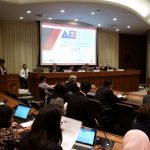ASEAN ECONOMIC INTEGRATION FORUM 2017
“50 YEARS AND BEYOND: FORGING AN INCLUSIVE ASEAN”
United Nations Conference Centre
United Nations Economic and Social Commission for Asia and the Pacific (ESCAP)
Bangkok, Thailand
14-15 September 2017
Equitable, inclusive and sustainable growth key for ASEAN to thrive in next 50 years
The ASEAN Economic Integration Forum 2017 (AEIF 2017) opened in Bangkok on Sept 14, 2017 with calls to promote more inclusive growth in the development of the ASEAN Community, especially by empowering women and youth as well as promoting sustainable economic development.
Over 100 regional and global participants from civil society, academia, business and government attended AEIF 2017, organized by the United Nations Economic and Social Commission for Asia and the Pacific (ESCAP), the Institute of Malaysian and International Studies (IKMAS), the World Bank Group, St. Antony’s College Oxford University, the World Trade Institute, University of Bern, Switzerland and Air Asia.
Opening the two-day Forum, United Nations Under-Secretary General and Executive Secretary of ESCAP Dr. Shamshad Akhtar said, “Over the past 50 years ASEAN has demonstrated the virtues and high dividends of regional cooperation, both for development and peace and security which reinforce each other. Today, ASEAN is positioned to be a key driver of further integration in the Asia Pacific region guided by the 2030 Agenda.” She also added “Working together and building on ASEAN’s experience, we have an opportunity to take integration in Asia and the Pacific a step further and support growth, jobs and sustainable development across Asia and the Pacific.”
Dr. Alan Bollard, Executive Director of Asia-Pacific Economic Cooperation (APEC) Secretariat further emphasized that both ASEAN and APEC have helped promote trade-driven growth in the past, but “we realise that there are different challenges ahead, so we need to learn from one another’s new approaches.”
Since its creation, ASEAN has transformed into the world’s sixth-largest market, third-largest labour force and is projected to become the fourth-largest economic bloc by 2030. Despite high economic growth over the past two decades, many countries in the region are experiencing widening disparities. A recent United Nations study estimated that in 2015, women’s lack of equal employment cost Southeast Asian economies about 18% of GDP, amounting to nearly half a billion dollars.
“The economic and social integration of ASEAN will transform the lives of people across Southeast Asia. The creation of the ASEAN Economic Community (AEC) has been a big step,” said Dr. Ulrich Zachau, World Bank Director for Regional Partnerships, Malaysia and Thailand. “Further financial, labor market, and infrastructure integration in the AEC can bring massive gains for people, such as more access to more financial services and jobs; faster and cheaper travel of goods and people within ASEAN; and better protection from disaster risks.”
Highlighting the role of higher education institutions to ensure continued understanding of the importance of ASEAN integration among its people, Prof. Tan Sri Dato’ Seri Dr. Noor Azlan Ghazali, the Vice Chancellor of the Universiti Kebangsaan Malaysia (UKM) said, “ASEAN is an important agenda of UKM, where UKM has made ASEAN Integration as one of the grand challenges in the university’s teaching and research.” The role of volunteerism as a mechanism for ASEAN integration especially among youth was highlighted by H.E Tunku Zain Al-Abidin Tuanku Muhriz, The Royal Fellow of UKM, and Founding President, Institute for Democracy and Economic Affairs (IDEAS)
The third in the AEIF series, the Forum also featured several eminent roundtables addressing opportunities and challenges faced by ASEAN in areas such as engaging community, positioning business, connecting partners and developing greater connectivity through the ASEAN Open Skies agreement. H.E. Mr. Arkhom Termpittayapaisith the Minister of Transport, Thailand emphasized on the aviation industries that growing rapidly in this region could benefit to all ASEAN countries but need to be discussed more seriously regarding the safety issues. The most up to date safety policies should be comply within all nations in ASEAN in order to follow the safety standard of Department of Civil Aviation from each country. In June 2016, a US$5.5 billion plan was also announced to expand the country’s airports over the next 15 years to facilitate the volume of tourist that will visit Thailand.
Air Asia Chief Global Affairs Officer, Mr. Juergen Keitel believed ASEAN is the place to be in now. Confident of continued growth in the region, Air Asia is thinking of setting up associate airlines in other ASEAN countries. It plans to open more routes, increase flight frequencies, offer new products and services, and set more joint ventures in the region. It is bullish on the ASEAN Community and sees the ASEAN integration as a component of its future success. For AirAsia, an integrated ASEAN will result to more streamlined operations, increased access to a bigger talent pool, higher demand for travel, and a more encouraged investment climate. The implementation of ASEAN Open Skies, in particular, is envisioned to mean growth in number of destinations and frequencies, and true liberalization of air travel.
AEIF 2017 saw the launch of the ASEAN Economic Integration Platform (AEIP). This platform will strengthen the network among partners especially within the ASEAN University Network (AUN).
Prepared by;
Dr. Sufian Jusoh, Deputty Director and Senior Fellow, IKMAS, Universiti Kebangsaan Malaysia,
T: (60) 16 5503373 / E: sufianjusoh@ukm.edu.my









